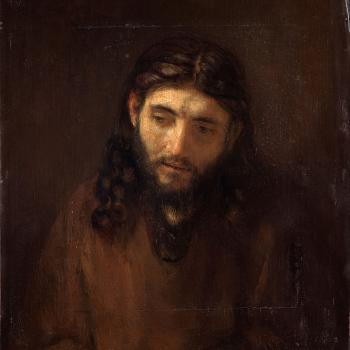
Atheist and anti-theist Bob Seidensticker runs the influential Cross Examined blog. He asked me there, on 8-11-18: “I’ve got 1000+ posts here attacking your worldview. You just going to let that stand? Or could you present a helpful new perspective that I’ve ignored on one or two of those posts?” He also made a general statement on 6-22-17: “In this blog, I’ve responded to many Christian arguments . . . Christians’ arguments are easy to refute.” He added in the combox: “If I’ve misunderstood the Christian position or Christian arguments, point that out. Show me where I’ve mischaracterized them.” I’m always one to oblige people’s wishes, so I decided to do a series of posts in reply.
It’s also been said, “be careful what you wish for.” If Bob responds to this post, and makes me aware of it, his reply will be added to the end along with my counter-reply. If you don’t see that at the end, rest assured that he either hasn’t replied, or didn’t inform me that he did. Bob’s words will be in blue. To find these posts, word-search “Seidensticker” on my atheist page or in my sidebar search (near the top).
*****
In his post, “You Know the Photo that Came with Your New Wallet? God Is Like That.” (5-29-17), Bob — ever the inquisitive one — asked: “If the Trinity is so important, why aren’t the specifics made clear in the Bible?” He linked in the question to a paper devoted to the Trinity (dated 6-10-13; republished on 7-23-16),where he stated:
The Christian doctrine of the Trinity claims one God in three persons. The Catholic Encyclopedia defines it this way: “In the unity of the Godhead there are Three Persons, the Father, the Son, and the Holy Spirit, these Three Persons being truly distinct one from another.” . . .
Though the Trinity is one of the most fundamental doctrines of Christianity, the Bible says nothing about it directly. Did Paul and the apostles define God in a trinitarian fashion? Nope.
As usual, Bob’s treatment is like a puddle that is a mile wide and a quarter-inch deep: lots of words but little substance (and even less reason). One would think he would at least examine a few Bible passages. Wouldn’t that be expected, since he has claimed that Paul and the apostles were not trinitarians?
Yes it would; but Bob’s anti-Christian posts are anything but reasonable or compelling (nor are they in the least bit fair to Christianity). Thus, he cites only 1 John 5:7 in its entirety and notes that it is a disputed passage. It is disputed (we agree), and so it’s a moot point as to this debate. Bob also mentions John 1:1 in passing, as an indication that Jesus is eternal. That’s it (believe it or not)!
There are literally hundreds of other relevant passages, that I myself have compiled with regard to the Holy Trinity and also the divinity of Christ. I’ve also written shorter, handier treatments of biblical evidences for both the Trinity and Godhood of Jesus. This was one of my earliest research projects, as a budding Christian apologist: way back in 1982, fresh out of college. I also have a very extensive web page devoted to the topic, as well as a book.
The New Testament refers to the Father, Who is God. This is basically the same concept as the God of the Old Testament, as understood by the Jews: an immaterial eternal spirit Who created the world, is all-good, is the Judge of the world, and is omnipotent, omniscient, and omnipresent. We need not spend any further time on that. I think even Bob would readily agree that this is what the Bible presents.
Many (including Bob) seem to think that the New Testament doesn’t state that Jesus is God, or that if it does, the passages are difficult to find and/or unclear and non-compelling. I’ve always marveled at this. There are a great many clear passages that could hardly be interpreted in any other way than that Jesus is God in the flesh. Here is a generous sampling:
John 1:1, 14 (RSV) In the beginning was the Word, and the Word was with God, and the Word was God. . . . [14] And the Word became flesh and dwelt among us, full of grace and truth; we have beheld his glory, glory as of the only Son from the Father.
John 10:30 I and the Father are one.
Jesus’ hearers, unbelieving Jews, certainly understood His intent in saying this, because they tried to stone Him, as the next verse informs us, since they didn’t believe His claim, which, if indeed untrue, would be intolerable blasphemy. 10:33 informs us that they tried to stone Him because (in their words) “you, being a man, make yourself God.”
John 20:28 Thomas answered him, “My Lord and my God!”
If it were untrue, Jesus would have corrected Thomas, but He didn’t.
Colossians 1:19 For in him all the fulness of God was pleased to dwell,
In context, it is the Son Who is being described (1:13); He is eternal (1:15, 17-18), the Creator (1:16), and the unifying principle of the universe (1:17; cf. Heb 1:3): all attributes true only of God. Paul makes the notion even more explicit in the next chapter:
Colossians 2:9 For in him the whole fulness of deity dwells bodily,
2 Peter 1:1 . . . our God and Savior Jesus Christ: (cf. Titus 2:13)
Hebrews 1:8 But of the Son he says, “Thy throne, O God, is for ever and ever, the righteous scepter is the scepter of thy kingdom.”
This is a remarkable passage, in which God the Father calls His Son “God.” It is a reference to the Old Testament passage, Psalms 45:6-7.
In Hebrews 1:6, God the Father also says that all the angels should worship God the Son. Worship can only be rightly applied to God, as we know from Exodus 34:14 and Deuteronomy 8:19. Yet Jesus accepted worship of Himself on many occasions (e.g., Mt 14:33; 28:9) and stated that He should be honored equally with the Father (Jn 5:23). In Revelation 5:8, 12-13 and Colossians 2:6-7, we find that Jesus is worshiped in every way that the Bible specifically describes worship of God the Father, with all the same words used (see: Rev 4:9-11, 5:13; 7:11-12, and Rom 11:33).
Jesus is omnipotent (Phil 3:20-21) and omniscient (Col 2:2-3). Many attributes that are said to belong only to “God” are applied to Jesus in Scripture. God the Father said, “besides me there is no savior” (Is 43:11; cf. 1 Tim 4:10). Yet Jesus is called the “savior” of mankind in passages like Luke 2:11 and many others.
God the Father stated, “To me every knee shall bow, every tongue shall swear” (Is 45:23). The same exact description is also applied to Jesus (Phil 2:10-11). The Bible teaches that “God” is judge (1 Sam 2:10; Ps 50:6; Ecc 12:14; many others). But so is Jesus (Jn 5:22, 27; 9:39; Acts 10:42; 2 Tim 4:1). Therefore He is God. God the Father sits on His throne in heaven (1 Ki 22:19; Ps 11:4; 47:8). Jesus is on the same throne, too (Rev 7:17; 22:1, 3).
At every turn in the Bible, only one conclusion is possible, to make sense of all these statements, taken together as a whole: Jesus is God the Son. He is the eternal, all-powerful, all-loving, self-existent Creator God.
So that gives us two Persons in the Triune God: Father and Son; and as we can see, the data as to what the Bible teaches (agree with it or not) is quite obvious and indisputable. So we are left with the deity of the Holy Spirit. Where is that in Scripture? Here is the best single passage along those lines:
Acts 5:3-4 But Peter said, “Anani’as, why has Satan filled your heart to lie to the Holy Spirit and to keep back part of the proceeds of the land? [4] . . . You have not lied to men but to God.” . . .
Ananias lied to the Holy Spirit; at the same time he lied to God; therefore the Holy Spirit and God are synonymous: one and the same. I could produce several others (see my related paper for that), but this suffices to overthrow Bob’s ignorant claims above.
Next, we need to see some indication that the Bible has an awareness of “Father, Son, and Holy Spirit: mentioned together, implying that all are God and that there are three Persons Who are the one God (monotheism). No single passage states, “The one God exists in three Persons: Father, Son, and Holy Spirit.” Yet, for example, we see a verse that strongly suggests the same, with just a little deduction:
Matthew 28:19 (RSV) Go therefore and make disciples of all nations, baptizing them in the name of the Father and of the Son and of the Holy Spirit,
“In the name of” is a common Old Testament phrase that was applied to God. The phrase, “in the name of the LORD” appears 29 times there. So to apply this sort of formulaic language also to the Son Jesus and the Holy Spirit was to assume that they were God. In my research, I have found 40 passages that mention all three Divine Persons. Here are eight of them (just one-fifth of all):
Isaiah 61:1 The Spirit of the Lord GOD is upon me, . . . (cf. 61:2; Jesus applies this to Himself in Lk 4:16-30)
Luke 3:21-22 . . . when Jesus also had been baptized and was praying, the heaven was opened, [22] and the Holy Spirit descended upon him in bodily form, as a dove, and a voice came from heaven, “Thou art my beloved Son; with thee I am well pleased.” (cf. Mt 3:13-17)
John 15:26 But when the Counselor comes, whom I shall send to you from the Father, even the Spirit of truth, who proceeds from the Father, he will bear witness to me; (cf. 14:26)
Acts 2:33 Being therefore exalted at the right hand of God, and having received from the Father the promise of the Holy Spirit, he has poured out this which you see and hear. (cf. 7:55)
Acts 20:28 Take heed to yourselves and to all the flock, in which the Holy Spirit has made you overseers, to care for the church of God which he obtained with the blood of his own Son.
Romans 15:30 I appeal to you, brethren, by our Lord Jesus Christ and by the love of the Spirit, to strive together with me in your prayers to God on my behalf, (cf. Eph 2:18)
1 Corinthians 6:11 . . . justified in the name of the Lord Jesus Christ and in the Spirit of our God. (cf. 1 Pet 1:2)
2 Corinthians 13:14 The grace of the Lord Jesus Christ and the love of God and the fellowship of the Holy Spirit be with you all.
If the Bible teaches that God (and only God) has certain characteristics, and proceeds to apply them to three Persons: called the Father, Son, and Holy Spirit, then they are all one God (since the Bible teaches there is but one: Dt 6:4; 32:39; Is 43:10; 44:8; 1 Cor 8:4-6). This sort of thing occurs over and over in the Bible: equivalent characteristics in many respects are applied to all three Divine Persons:
1. Who raised Jesus from the dead? Well, it was God the Father (Gal 1:1; 1 Thess 1:10); it was also Jesus Himself (Jn 2:19; 10:17-18); and it was the Holy Spirit (Rom 8:11).
2. Who gave the new covenant? The Father (Jer 31:33-34); Jesus (Heb 8:1-13; 10:29; 12:24; 13:20); the Holy Spirit (Heb 10:15-17).
3. Who sanctifies believers? The Father (1 Thess 5:23); Jesus (Heb 13:12); the Holy Spirit (1 Pet 1:2).
4. Who is the creator? The Father (Gen 1:1; Is 44:24; Acts 17:24; Eph 3:9); Jesus (Jn 1:3; Col 1:16; Heb 1:8, 10); the Holy Spirit (Job 33:4).
5. Who indwells believers? The Father (1 Cor 3:16a; 2 Cor 6:16; 1 Jn 3:24); Jesus (Jn 6:56; Rom 8:10; Eph 3:17); the Holy Spirit (Jn 14:16-17; Rom 8:9, 11; 1 Cor 3:16b). The Bible even describes this in terms of different combinations: Father and Son (Jn 14:23); Father and Holy Spirit (Eph 2:21-22; 1 Jn 3:24); Son and Holy Spirit (Gal 4:6).
What one Person does, the others also do in complete agreement and unity, and the Persons “interpenetrate” each other. Christian theology has 50 cent words for this: circumincession (Latin) or perichoresis (Greek).
Lots of things are very difficult to understand, yet firmly believed; for starters (speaking of scientific beliefs) : quantum mechanics, the physics of black holes, the nuclear fusion that occurs in the center of our sun, the “bending” of space and time (Einstein’s relativity), and dark matter (presently accepted by most physicists and other scientists and said to comprise 85% of all matter, but very mysterious indeed). Physical reality has turned out to be very “weird” and unpredictable. Theology is also sometimes striking, and seemingly “odd” and unfathomable. This should not surprise us at all (since God is an extraordinary Being).
Cumulative arguments based on scores of individual indications become very compelling: much as a large rope, consisting of many individual strands woven together is exceedingly strong. Such is the nature of biblical indications for the Holy Trinity. We find them at every turn. No one should be led astray to think that the Holy Trinity is not “biblical.” Having seen the many reasonable proofs, we believe in faith.
Once again, therefore (surprise!), Bob is dead wrong in his claims about the Bible. He was correct (in the main) — credit where it is due — in observing that trinitarian doctrinal theology developed for four centuries. But this is no “problem” or disproof, since all Christian doctrines develop (just as science continually develops and builds upon what has been established). Development is my favorite topic in theology and I have a web page on that too.
Development doesn’t mean that the doctrines were not present in all essential aspects from the beginning of Christianity. I have just shown how there is abundant biblical evidence for trinitarian doctrine, which is precisely what Bob claimed was not the case. Sometimes it is deductive, but it’s still there, and all the evidences taken as a whole, are indisputable. If some people like Bob have a difficult time finding them in the Bible, well, then, it’s the job of apologists like myself (and other Christian teachers) to give him a little aid and advice on where to look. I’m more than happy to help.
But I won’t hold my breath for Bob to be persuaded of this and to retract his misguided, false statements above. This is now my ninth critique of his work in my ongoing series, and Bob hasn’t made a peep in reply yet. It’s crickets all around. I don’t expect this paper to bring forth his first attempt at a refutation of my material. His confident and grandiose claims that I cited at the top somehow don’t seem to apply to me. Bob avoids my counter-arguments like the plague. Instead, in his latest known comment about me, he opined: “If I follow him in his race to the bottom, he’d beat me on experience. He’s a much better schoolyard bully than I am, and I’ve lost interest in his whining.”
***
Here is the latest rhetoric (8-18-18) as to Bob’s continuing non-replies to these posts (which are public and therefore can be responded to publicly on his blog in new posts there) is as follows:
“Lark 62”: I glanced at the most recent for grins. A big chunk was criticism that you haven’t responded to the previous 8 posts, with no hint that he had banned you so you couldn’t reply. Dishonest even for a christian. I think he’s getting lonely in his echo chamber, and without commenters he has nothing to plagiarize from. It reads like he’s trying to goad you into a reply on your blog so he gets traffic again. Thoroughly pathetic. (link)
Bob Seidensticker: I’ve always seen comments as good feedback that the post meant something. Pretty sad. 6 months ago, I’d have been delighted to have him be interested enough to give thoughtful critique to some of my arguments. I highly doubt that “thoughtful critique” is what they’ve received, and I now have zero interest in trudging through his posts to find out. (link)
***
Photo credit: spirit111 (Oct. 2017) [Pixabay / CC0 Creative Commons license]
***













